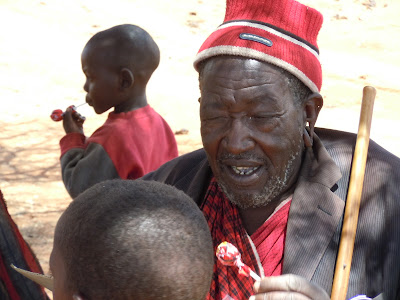 |
| A KWGP second level member with her children. |
Wednesday, September 26: Mornings like the one I had today nourish me for even the most difficult
of times. It’s why I, and many others in Canada and Tanzania, spend countless
hours working hard so that TEMBO Trust can grow and succeed. Our commitment is
to educate and empower girls and women and to develop the capacity for this
work to be sustainable.
Just as the sun was about to rise behind Mt Longido, Sanjoy,
Lesaloi, and I were already on the road to Kimokouwa about to pay an early morning
visit to some of the women in the KWGP – the Kimokouwa Women’s Goat Project. It
is one of the activities I most look forward to whenever I visit Tanzania. We travel
by motor bike since the bomas of the women who care for the goats are scattered
over many kilometers of very rough terrain. The only roads are the ones we
make.
 |
| Sanjoy, one of TEMBO's two good shepherds. |
For our visit today, Sanjoy has chosen two women who were original members
of the group in 2010, and two members of the second level – women who are now in
the KWGP because of goats they have received from the original, or first level
members. Sanjoy and Oyaya make weekly trips to visit the women to record and help with births, deaths, sicknesses, challenges, and successes. They have basic training
in veterinary care and are able to vaccinate the goats and treat minor
illnesses. Lesaloi came along to act as translator for me, since he speaks
three languages well: Kimaasai, Kiswahili, and Kiengaresa or English.
 |
One of the drought tolerant Isiolo goats with
a tag in the right ear. |
The air is fragarant with earthy smells as we drive off the
highway and into the countryside, waving and honking at the other early risers
we pass along the way. You never pass a person in these parts here without greeting them in
some fashion.
 |
| Lesaloi with Mt Longido behind. |
It’s the dry season and we arrive at the first boma early or we
will miss seeing the goats. They have to travel long distances now in order to
find food so they must get an early start. We meet one of the original
members who lives on the mountain side of the highway. She has been very
successful. No deaths due to disease and one stillborn. Her goats now have ‘grand
goats’ and as soon as the young one she points at is weaned and given away she
will have met the conditions of the program. She will be free to sell both male
and female goats and keep 90% of the selling price. Until now she has had to
give her two firstborn females to other women - that's how the program becomes sustainable. She has sold males for 60,000
TZS or about $45.00 CAD each. And she has had milk from the goats each day for
her children. Sanjoy is beaming as he relates these details to me through Lesaloi.
His pride, understandably, cannot be concealed.
Before the goats go out to graze they are given some food to
get them started. They are eating dry seeds that have fallen from the acacia
tree (like elongated maple keys). Lesaloi explains they are full of nutrients.
He says, “Nature is very intelligent. In the rainy season there is plenty of green
food to eat. In the dry season there are leaves and seeds to provide
nourishment.” The KWGP goats are easily identifiable as they graze, wearing
blue or green ear tags sent from Canada and affixed by Sanjoy or Oyaya when the
baby goat is old enough.
 |
| Two young shepherds at rest. |
Time is passing and we travel on to meet some of the other women in the
program. Every woman's story is similar. Everyone is very grateful to TEMBO. All the goats look healthy and well fed. Everyone feels well supported by Oyaya and Sonjoy.
Next week I will sit with Oyaya, and Sanjoy to do a full review of the KWGP. Sanjoy says the goat project is 'just
beginning' and that great things lie ahead. He adds, "This will be very big and it will be very successful". He and Oyaya, themselves
goat keepers, have taken such a sense of ownership of and pride in the KWGP. I also anticipate great things ahead under their leadership and guidance.
By 10 a.m. we are back at the TGH in time for staff chai. I am dusty, smelling of the earth, hungry, and very happy.


















































